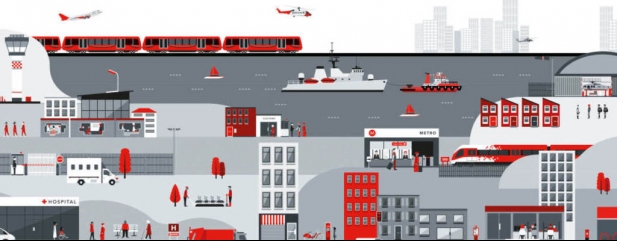Archived article
Please note that tax, investment, pension and ISA rules can change and the information and any views contained in this article may now be inaccurate.
The second coming of Serco

Public sector service companies such as Serco (SRP) have had something of an historic image problem. As governments around the world sought to procure more services for less money, corners were inevitably cut resulting in some high-profile failings.
Security firm G4S (GFS) made the headlines in 2012 after it bungled a £238 million government contract to provide security for the London Olympics.
Serco was fined £68.5 million after admitting it had fraudulently billed the government between 2010 and 2013 for tagging prisoners who had died.
 The crisis in the sector came to a head when Carillion, which employed 20,000 people and specialised in big public sector works like hospitals and the HS2 high speed rail line, as well as private sector projects such as the Anfield stadium expansion, collapsed in 2018 with £1.5 billion of debts.
The crisis in the sector came to a head when Carillion, which employed 20,000 people and specialised in big public sector works like hospitals and the HS2 high speed rail line, as well as private sector projects such as the Anfield stadium expansion, collapsed in 2018 with £1.5 billion of debts.
However, we now think Serco at least has got its house in order and the shares are worth buying for long-term investors.
NEW BEGINNING
For Serco, the road back to respectability has been long and not always smooth. Current chief executive Rupert Soames arrived in 2014 from Aggreko (AGK) with a brief to restore profitability but just as importantly to restore the firm’s credibility.
Soames, who had grown Aggreko’s market value by nearly ten times, was a popular choice with investors but he was quick to acknowledge the scale of the task at hand.
‘I am aware that the company has experienced significant recent difficulties but the work that Serco does is important to the lives of millions of people and I believe that we can find a way through to a bright future.’
There was no quick fix, and as Soames often said when presenting the firm’s results to analysts, there were more than a few ‘bumps in the road.’
Key to getting the firm back on an even keel was dealing with contracts which had been poorly structured, many of which left the company exposed to cost over-runs even when they were out of its control.
Altogether the firm identified close to £450 million of contracts which it classed as ‘onerous’ and began putting aside provisions to cover potential losses. Happily, in its first half results (6 Aug), the firm revealed that onerous contract provisions had dwindled to just £1.7 million compared with £42.1 million in the first six months of last year.
KEY PRINCIPLES
In order to avoid a repeat of this scenario and improve the reputation of outsourcing firms, the firm established four principles which it wants governments and suppliers adopt.
These are greater transparency, preferably using open-book accounting, on non-sensitive contracts, together with an ‘orderly exit’ clause which allows either party, on payment of an agreed break fee, to exit a contract at pre-determined intervals.
Governments and suppliers should sign up to a mutually-agreed code of conduct which would prevent the former from imposing punitive terms or transferring ‘unmanageable state risk’ onto the latter.
Finally, firms undertaking sensitive work should lodge a ‘living will’ with the government in order to avoid the kind of chaos which followed the Carillion collapse.
BUSINESS SPLIT
Serco operates in the defence sector, health sector, citizens services, immigration, justice and transportation. Just over 40% of its revenue comes from the UK and Europe, where revenue in the first half of this year grew by 19% on an organic basis.
This figure was boosted by asylum accommodation contracts and a surge in Covid-19 work like drive-through and mobile virus testing centres and support for NHS trusts and Public Health England.
The Americas, which make up 30% of turnover, had a truly exceptional first half with revenue up 46% thanks to 8% organic growth, a 3% currency gain and a 36% boost from its newly-acquired Naval Systems Business Unit (NSBU), which designs ships and submarines and supplies engineering services and support to the US Navy.
The rest of the firm’s revenue comes from Australia, the Asia Pacific region and the Middle East. Of these areas, only the Middle East grew revenues by less than 10% in the first half of this year, due to lower air traffic and navigation systems revenues and a drop in activity in parts of its transport portfolio without any offsetting Covid work.
FOUR FORCES
Serco has identified four ‘forces’ which it believes will continue to drive public sector demand for privately-supplied services. Governments will have more debt – especially post-pandemic – while deficits will need to be stabilised, higher taxes will remain unpopular and the public will rely more on public services. Therefore, governments will need to keep delivering more and better services, for less.
It sees these forces creating a worldwide market growing at between 5% and 7% per year in revenue terms with trading margins of between 5% and 6%.
On top of this growth, Covid has brought extra work, some of which may last beyond this year. The firm registered £130 million of additional revenue in the first half, which was partly negated by £50 million of contract cancellations.
It’s worth pointing out that this net £80 million of revenue was profit-neutral – meaning the firm didn’t benefit from the pandemic at the expense of the taxpayer – yet the overall gross margin on turnover rose from 3.4% to 4.3% as more profitable contracts came through and the firm managed its costs.
STRONG OUTLOOK
As well as an impressive jump in first half earnings, the firm brought in more new orders than revenues - £1.9 billion against £1.82 billion – despite Covid disruption to the sales and bidding process.
The largest contract was £450 million to continue operating the Northern Isles Ferry Service. Two more contracts had a total value above £200 million each, and over 20 awards were worth more than £10 million each.
Roughly 60% of the orders were rebids and extensions of existing work while 40% comprised new business. Encouragingly, the win rate by value for new work was 43% against an historic average of 30%.
The company confirmed the financial guidance it gave in June, with underlying trading profits for 2020 at similar levels to pre-pandemic expectations. It admitted that Covid-19 work was by its nature short-term and may not continue much into 2021, but it also highlighted that 90% of its employees are front line workers. Moreover, the crisis has amplified the four forces driving government demand for its services.
There was disappointment among investors that the firm delayed a decision on whether to pay the final 2019 and interim 2020 dividends until after it had repaid its deferred taxes, but Soames was unapologetic, describing it as ‘inappropriate’ to take government support and then pay out millions to shareholders.
In response to the share price reaction – a 15% fall on the day of the results – Soames was equally forthright, saying ‘Those who mind don’t matter, those who matter don’t mind.’
A FUND MANAGER'S VIEW
Christian Diebitsch, manager of the Heptagon European Equity Focus Fund – which gained 38% last year compared with a 26% increase in the MSCI European Total Return Index in sterling terms, and is up 6.2% for the year to 31 July against a 14% fall for the benchmark – is a firm believer in Serco’s staying power.
He points to the company’s ‘superior organic growth rate compared with the rest of the market and its drive to ‘clean up’ the market for public services in the UK.’
He also believes the firm was ‘right to defer the symbolic 1p per share final dividend as it utilised the government’s furlough scheme and deferred VAT payments.’
While growth in revenue and earnings in 2021 will be below 2020’s ‘exceptional level’, as he points out it will be from a higher base.
Important information:
These articles are provided by Shares magazine which is published by AJ Bell Media, a part of AJ Bell. Shares is not written by AJ Bell.
Shares is provided for your general information and use and is not a personal recommendation to invest. It is not intended to be relied upon by you in making or not making any investment decisions. The investments referred to in these articles will not be suitable for all investors. If in doubt please seek appropriate independent financial advice.
Investors acting on the information in these articles do so at their own risk and AJ Bell Media and its staff do not accept liability for losses suffered by investors as a result of their investment decisions.

 magazine
magazine








